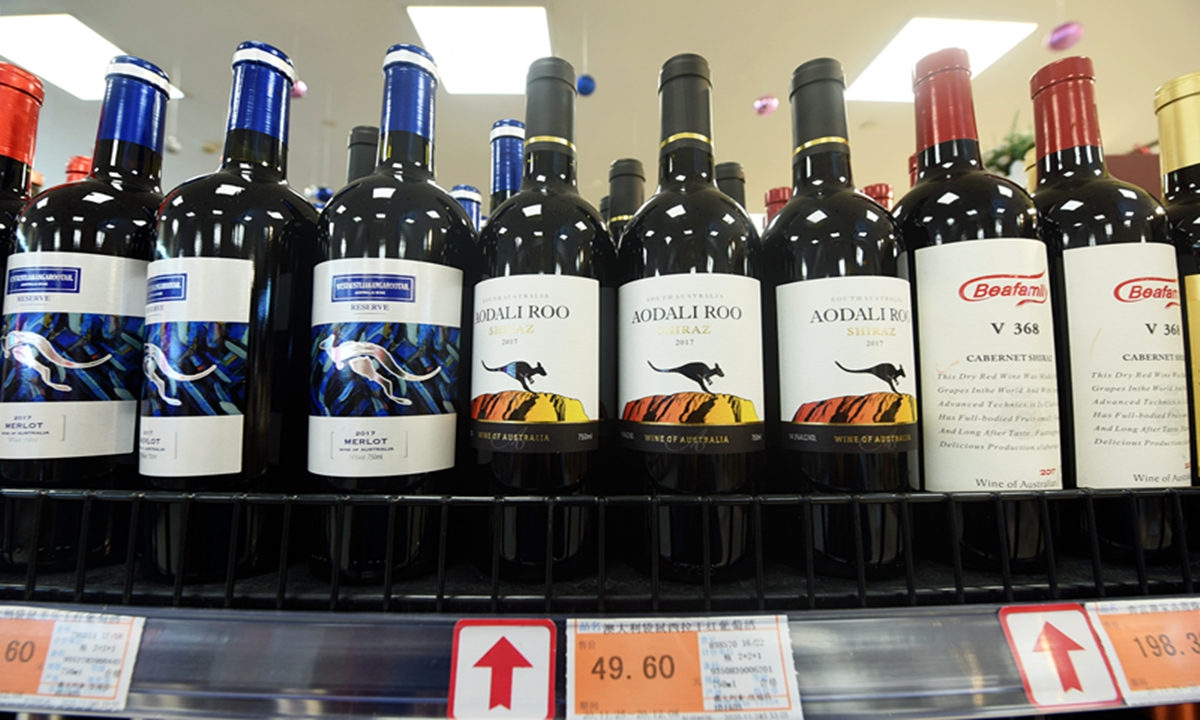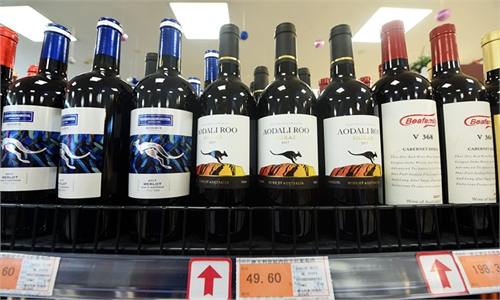Australian wine shunned for Spring Festival
Chinese importers seek alternatives sources

Bottles of Australian wine on the shelf of a supermarket in Hangzhou, East China's Zhejiang Province on November 27, 2020 Photo: VCG
Australian wine, which had a large market presence in China before the Scott Morrison government soured bilateral ties with his anti-China policy, completely missed out on a surge of holiday sales for the upcoming Spring Festival holiday in China due to anti-dumping duties.
Australia on Thursday reported a trade and services surplus of A$72.7 billion ($55.47 billion) for 2020, an increase of A$5.2 billion from 2019, but its wine exports to China have declined.
The figures followed a year of trade tensions between Australia and China, its largest trading partner, as the Morrison government chose to tie itself to the Trump administration's anti-China campaign and damage its relationship with China.
Despite a rise in iron ore prices that shored up Australia's trade with China, some sectors are feeling the impact of strained bilateral ties. Wine was hit in particular.
The volume of Australian wine exports to China declined by 29 percent to 96 million liters in 2020 while the total export value contracted by 14 percent to A$1.01 billion, according to a report by industry body Wine Australia .
China imposed temporary deposit tariffs of up to 212 percent last November after an anti-dumping probe started in August.
An industry observer told the Global Times on Thursday that after the tariffs were imposed, companies in China could no longer afford to import Australian wine due to the extra financial burden, and they have started to diversify their import sources.
A blogger in Shanghai, surnamed Fan, told the Global Times on Thursday that traditionally, wine has been a major category of consumption as companies celebrate the New Year by sending wine as gifts to clients.
But now that opportunity can no longer be enjoyed by wine from Australia, and this is not just for the Spring Festival holidays.
Chen Wei, manager of the Shishun International Trade Co, told the Global Times that almost all importers stopped imports of Australian wine after December, causing the product to miss out what used to be a major selling season.
"Now we rely on inventories. After that, our company plans to look at Spain, Italy and Chile as future import sources," Chen said.
"Compared with other Australian exports such as iron ore and coal, wine is the most vulnerable, as there are plenty of alternatives around the world to Australian wine," said Fan who follows the catering and dining industry.
Fan said he noticed that New Zealand wine sales had been picking up and things will change further after stocks built up by retailers run dry.
Australian wine used to enjoy a great price advantage in the Chinese market thanks to the China-Australia free trade agreement, which offers tariff discounts for wines.
Per data from Wine Australia, China remained the top export destination for Australian wines in 2020, despite dropping by 10 percent to A$1.15 billion. The UK, which was Australia's second-largest export market, only accounted for A$456 million.
There was a brief surge of exports to China in September and October, following the announcement of the anti-dumping probe, but exports were effectively wiped out in December after the tariffs kicked in, the Wine Australia report showed.
Song Wei, an associate research fellow at the Chinese Academy of International Trade and Economic Cooperation, said Australian wine risks losing its largest overseas market if bilateral ties continue to deteriorate.
This year "will largely be a dismal year for Australian wines, too, if bilateral ties continue to deteriorate," Song said.
Although China itself is being affected by a winter spike of coronavirus cases, its vast market is still treated with utmost importance by global brands. The country was the only major economy that managed to grow in 2020.
The market share of Australian wine is being squeezed by offerings from other countries.
A total of 2.6 million bottles of French wine were shipped to China by e-commerce platform Tmall Global during the 2020 Double 11 shopping festival last November, according to a statement sent to the Global Times by the company.
Song said wines from New Zealand and Europe in particular will get a boost as their economic and trade cooperation deepens.
Chen said wines from Spain and Chile are most likely to rise as a winner out of China-Australia trade spat.




